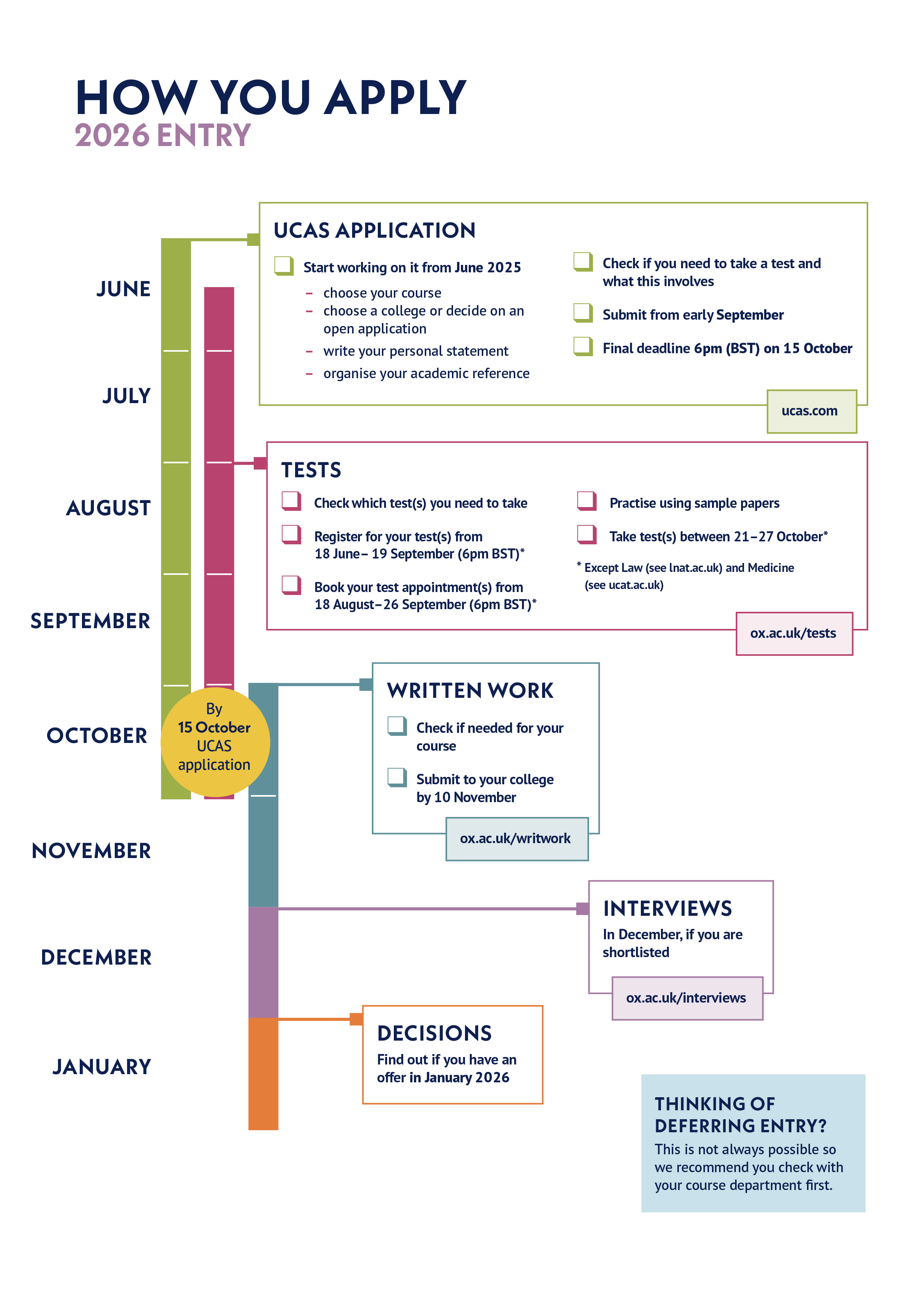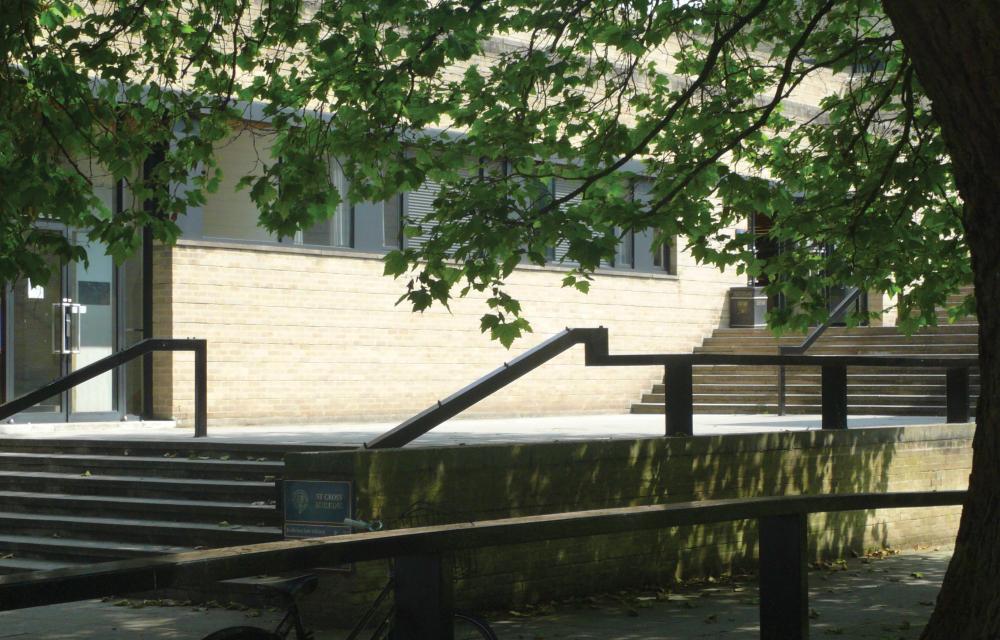IMPORTANT
Please note the following deadlines: 15 October 2025 @6pm for UCAS applications; 15 October 2025 to sit and complete the LNAT test. Due to high demand, applicants are advised to register and book their LNAT tests by 15 September 2025 in order to get a test date before 15 October 2025.
Overview
An outstanding university education that also serves as a qualifying law degree
The BA in Jurisprudence is our regular three year undergraduate law degree, equivalent to what in some universities would be called an LLB.
It is also a 'qualifying law degree' for the purpose of practice as a solicitor or barrister in England and Wales.
It is one of the most highly regarded undergraduate law degrees in the UK, and those who do well in it are in high demand both in the legal professions and in other fields in which professional analytical work is required.
Course in brief
Entry requirements
A-levels: AAA
Advanced Highers: AAB, or AA plus an additional HIgher at grade A
IB: 38 (including core points) with at least 666 at HL
Or equivalent (see list of international qualifications)
All candidates must also take the Law National Admissions Test (LNAT) as part of their application.
Please note the following deadlines: 15 October 2025 @6pm for UCAS applications; 15 October 2025 to sit and complete the LNAT test. Due to high demand, applicants are advised to register and book their LNAT tests by 15 September 2025 in order to get a test date before 15 October 2025.
Course structure
The programme isn't modular. The courses identified by the legal professions as necessary for legal practice (the 'foundations of legal knowledge') are also identified by Oxford as core academic law subjects, and all undergraduate law students in Oxford are required to take them.
You are also required to take a course in jurisprudence (theory of law). In your final year you have the chance to choose from a selection of optional subjects.
There are public examinations in your first year and your final year, but not your second year, although there is an essay in jurisprudence to be written over the summer vacation at the end of that second year. Your mark for this essay counts towards your degree result, so the exam in jurisprudence at the end of your final year is correspondingly shorter.
|
Moderations (MODS) |
Final Honour School (FHS) |
|---|---|
Year 1, terms 1 & 2 |
Year 1, term 3 - end of year 3 |
| A Roman Introduction to Private Law | Administrative Law |
| Constitutional Law | Contract |
| Criminal Law | European Union Law |
| Legal Research and Mooting Skills Programme (Stage 1) | Jurisprudence |
| Land Law | |
| Legal Research and Mooting Skills Programme (Stage 2) | |
| Tort | |
| Trusts |
These are the compulsory courses, but you will also take 2 optional courses. Here is a page showing the structure and details of the various components.
Why Oxford?
The best thing that Oxford did for me was to show me that uncovering the controversies and complexities of my subject (law) is an utterly fascinating, fulfilling and exciting experience. The notion that something is worth studying for its own merit is embraced here.
Verity (Law)
In all universities, a law degree calls for hard work. You must become familiar with a great deal of material across a wide range of legal topics. In Oxford, particular emphasis is placed on first-hand study of legal sources - the reading of statutes and cases, sometimes very long statutes and cases, in their original reported form. This means a lot of work in law libraries, of which Oxford has some of the best. As well as books you will increasingly work with online materials. Law is constantly evolving and infinitely thought-provoking.
A common misconception is that studying law is mainly a matter of memorizing data. It is true that there is a lot to remember but lawyers exist to use the law, not just to know it, and the main way that lawyers use the law is by making legal arguments. A central aspect of legal education in Oxford, as at other law schools, is learning to make a proper legal argument. This is a creative activity and calls for originality and inspiration as well as information and accuracy. The Oxford method of teaching by tutorials - weekly meetings between a tutor and two or three students - gives you particularly intensive training in the art of argument.
The Admissions Process
There are four main parts involved in applications for Oxford undergraduate law (BA Jurisprudence or BA Law with Law Studies in Europe):
UCAS All applications for undergraduate study at Oxford are made online via the University and Colleges Application System (UCAS). The deadline is 6pm UK time on 15 October. Complete the online form, selecting the course and college of your choice. To find the correct UCAS code for the Law course you wish to apply for, please click here. If you prefer to be assigned a college, rather than apply to a specific one, you can submit an Open Application. If you are applying with international qualifications, you can check whether or not your qualifications are eligible to make a competitive application here.
LNAT: In addition to the UCAS form, all applicants for Law are required to sit the Law National Aptitude Test (LNAT). You must register for the test yourself, and take it (in a test centre) between 1 September and 15 October in the year you are applying. When you register you will be asked which universities you intend to apply to, please ensure you tick all the universities you are interested in. Ticking the box allows that university access to your LNAT data. If you do not tick the box, we will not see your results and your application will be assessed without an LNAT score.
The LNAT is designed to test your aptitude for studying Law rather than any knowledge of the subject. The results are used both when shortlisting and when making the final admissions decisions. To access practice papers and to register for the test, please visit the LNAT website and register for the Law National Aptitude Test. The LNAT is designed to test your suitability to the study of Law and will assess your verbal reasoning, ability to interpret and communicate information, and decision-making skills. It does not require any prior knowledge of law and will not follow an IQ test style format, which means everybody sitting the LNAT starts from the same point.
Interviews: Shortlisted applicants who have made it through the first two stages of admissions will be invited to interview at an Oxford college (this could be your college of choice but note that you may be reallocated to another college). Our interviews are now held online. They are not testing for existing knowledge of law but want to test your on-the-spot thinking and ability to formulate arguments. Some colleges will provide pre-reading material before the interview, others will provide a short paragraph during the interview time.
Results: Most successful students will be issued a conditional offer subject to results confirmation in mid-August. This means that you will still need to achieve the A-Levels (or equivalent) grade specified in your conditional offer in order to be accepted for your place. The entry requirements for BA Jurisprudence are AAA at A-Levels or equivalent. For information on our specific entrance requirements, please see the University's pages here.
Watch our video about the Law interview
Admissions Statistics Report
The Faculty of Law publishes a brief report each year on the admissions process for the undergraduate degree BA Jurisprudence & BA Law with Law Studies in Europe (please note Senior Status applications are not included in the statistics). For further admissions statistics, please visit the University admissions page where you can find statistical reports and further detailed data.
The admissions flowchart

Frequently Asked Questions
Take a look at our FAQ's to find out more.





